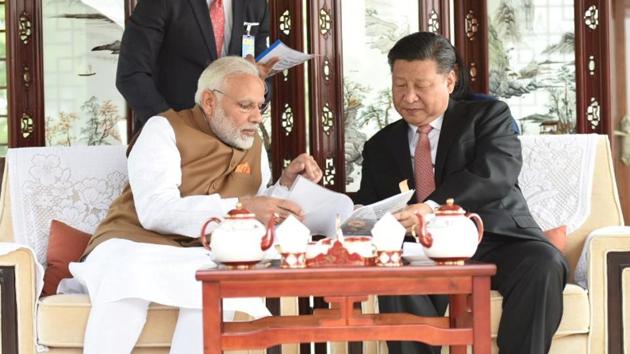Modi-Xi can pick up the phone, resolve issues: Sushma Swaraj on India-China ties
Sushma Swaraj says at her annual press conference that informal summit between Modi and Xi enabled the two leaders to discuss issues without any listed agenda.
The informal summit between Prime Minister Narendra Modi and Chinese President X Jinping in Wuhan last month saw them developing the kind of rapport that the two leaders can now speak to each other directly on any issue of importance, external affairs minister Sushma Swaraj said at her annual press conference on Monday.

Commenting on Pakistan at the same conference, Swaraj said that it was clear that talks and terror could not go on at the same time, referring to terror strikes in India by Pakistan-based terror groups.
However, justifying the talks between the national security advisers of the two countries, she said the mechanism was to ensure talks on terror.
Swaraj said the informal summit between Modi and Xi enabled the two leaders to discuss issues without any listed agenda.
“Today the ease (between them) is such that President Xi has said that whenever you think there is something going against you, pick up the phone and talk to me directly. And PM Modi said if you want to know my opinion about any subject, pick up the phone and talk to me. So this informal summit has established this ease,” Swaraj said.
The minister explained that there were three major objectives for the informal summit.
“First, smoothen relations; second, to bring an understanding on global issues; and third, increase mutual trust. All three objectives have been met. That’s why we termed the meet successful,” the minister said. The meeting, the minister claimed was an “unprecedented dialogue mechanism that has never been tried anywhere in the world”.
She said the status quo was restored and persists at Doklam, the India-Tibet-Bhutan tri-junction, where the India and Chinese armies faced off last year before Modi and Xi resolved the issue.
On ties with Pakistan, the minister said, “We are willing to have a dialogue, but with the caveat that terror and talks cannot go together. This has always been our position.”
The minister spoke out against the order on Gilgit-Baltistan on May 21 by Pakistan Prime Minister Shahid Khaqan Abbasi through which the national government got authority from the local council to deal with the affairs of the region. The order is seen as Islamabad’s efforts towards incorporating the disputed region as its fifth province.
“As for Gilgit-Baltistan being named by Pakistan as its fifth state, the same day we expressed our opposition, and the reply came more as a lesson on history and geography. I felt while reading their answer was, ‘look who’s talking’ They need not give us sermons on it,” the minister said.
The minister said India is in touch with the White House, the state department as well as US law makers on the curbs on work visas that would affect Indians: “We are talking to US White House, US state department, the US Congress and Senate to push US not to revoke H1B and H4 visas.” Swaraj said her government had undertaken “unprecedented outreach” in terms of Indian leaders visiting countries, many of which had never seen a high-level visit from this country. She said the government has ensured a visit has taken place to 186 out of 192 countries; in the past four years, it has brought home 90,000 stranded Indians from various troubled spots.






